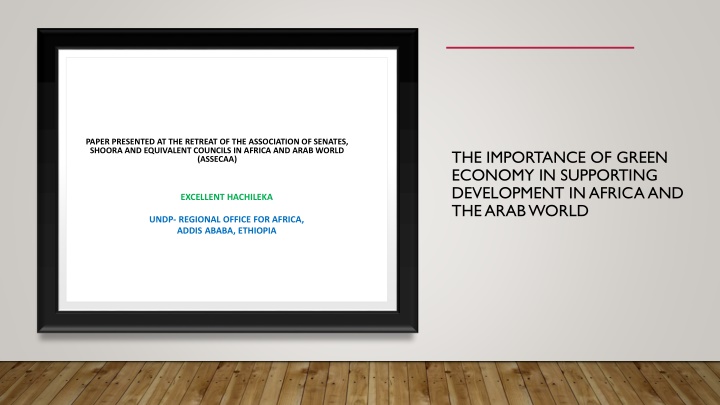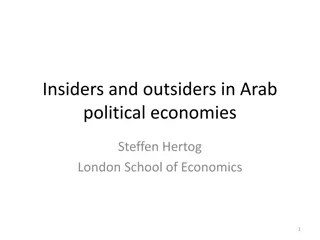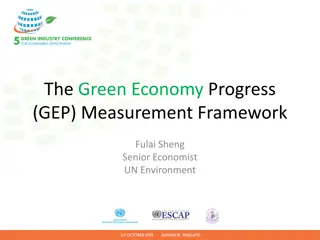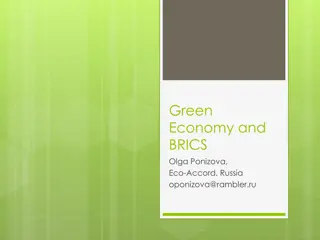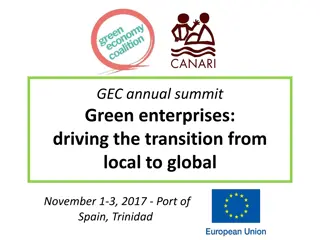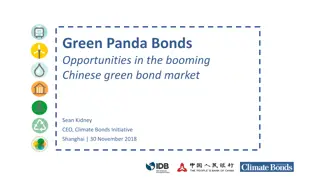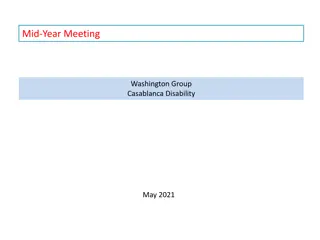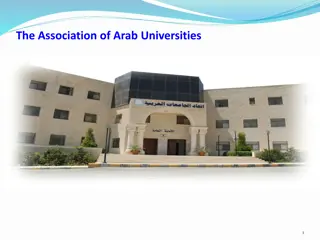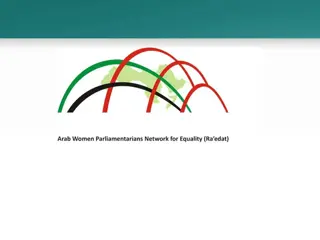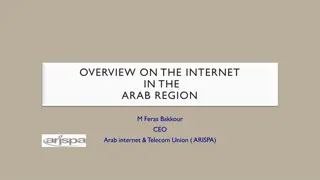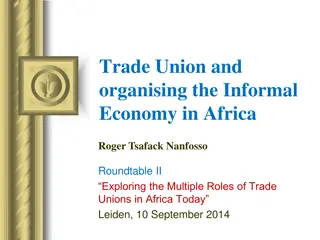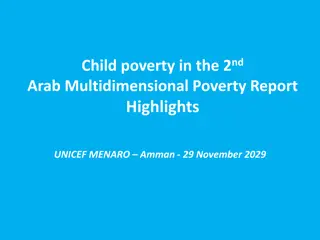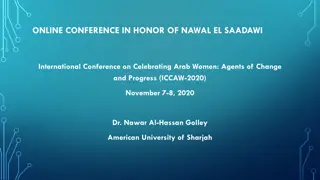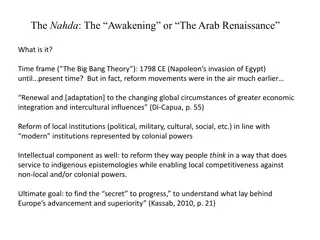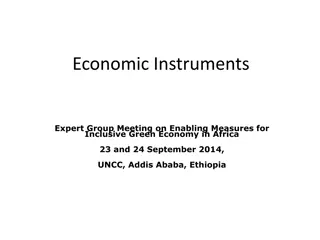Challenges and Opportunities: Green Economy Impact in Africa and Arab World
The paper presented at the ASSECAA retreat highlights the importance of the green economy in supporting development in Africa and the Arab world amidst the global economic crisis. It discusses challenges such as slow recovery from COVID-19, geopolitical instability, and climate change effects, emphasizing the need for a paradigm shift towards sustainable economic strategies. The impacts of the crisis on these regions, including vulnerabilities to economic shocks and disruptions in trade and investment, are examined alongside recommendations for implementing green economy approaches.
Download Presentation

Please find below an Image/Link to download the presentation.
The content on the website is provided AS IS for your information and personal use only. It may not be sold, licensed, or shared on other websites without obtaining consent from the author.If you encounter any issues during the download, it is possible that the publisher has removed the file from their server.
You are allowed to download the files provided on this website for personal or commercial use, subject to the condition that they are used lawfully. All files are the property of their respective owners.
The content on the website is provided AS IS for your information and personal use only. It may not be sold, licensed, or shared on other websites without obtaining consent from the author.
E N D
Presentation Transcript
PAPER PRESENTED AT THE RETREAT OF THE ASSOCIATION OF SENATES, SHOORA AND EQUIVALENT COUNCILS IN AFRICA AND ARAB WORLD (ASSECAA) THE IMPORTANCE OF GREEN ECONOMY IN SUPPORTING DEVELOPMENT IN AFRICA AND THE ARAB WORLD EXCELLENT HACHILEKA UNDP- REGIONAL OFFICE FOR AFRICA, ADDIS ABABA, ETHIOPIA
OUTLINE OF THE PRESENTATION The Context of the current Global Crisis The Impacts of the Global Crisis on African and Arab States The Green Economy and its importance as an alternative economic approach for Africa and Arab states Key Green economy strategies and interventions for Africa and Arab states The role of the Association in the implementation of a green economy approach Recommendations on how the Association can support implementation of the recommendations Conclusion and proposed actions
Slow recovery from COVID-19 Escalating geopolitical instability due to Russia- Ukraine conflict High energy prices, BRIEF OVERVIEW OF THE GLOBAL ECONOMIC CRISIS Soaring inflation High unemployment rates Budget deficits and debt burden Increasing interest rates Global economic slowdown
CLIMATECHANGE ADDED EFFCTS Climate change is also a significant challenge for African and Arab countries that is compounded by the COVID-19 pandemic and geopolitical tensions such as the Russia-Ukraine war. Challenges exacerbated by climate change: Increase in the frequency and severity of extreme weather events such as droughts, floods, and heatwaves with significant impacts Exacerbation of social tensions, including displacement, migration, and conflict over scarce resources such as water and land, and environmental impacts, including biodiversity loss, ecosystem degradation, and desertification.
IMPACTS OF THE GLOBAL ECONOMIC CRISIS ON AFRICA AND ARAB STATES The current global economic crisis has greatly impacted Africa and the Arab world, emphasizing the need for a paradigm shift towards a green economy: Africa and Arab countries are particularly vulnerable to economic shocks due to their high dependence on commodity exports, which makes them susceptible to price fluctuations in global markets. The Covid 19 pandemic and related restrictions have caused significant disruptions in trade and investment flows, which have negatively affected economic growth and development in these regions. The pandemic has disproportionately impacted the informal sector and vulnerable populations, leading to increased poverty and inequality The escalation of geopolitical tensions and the US-China trade conflict have had ripple effects on global trade and investment flows, creating uncertainty and volatility in financial markets.
IMPACTS OF THE GLOBAL ECONOMIC CRISIS ON AFRICA AND ARAB STATES The global crisis has resulting in economic slowdown and further exacerbated the already challenging economic conditions in Africa and Arab countries. High energy prices and inflation have also impacted these regions, leading to increased costs of production, and living. This has further constrained economic growth, leading to high rates of unemployment, budget deficit, and indebtedness. The increasing interest rates have also contributed to the economic slowdown in these regions.
RESPONSE TO THE GLOBAL CRISIS IN AFRICA AND ARAB STATES African and Arab countries have implemented various policy measures such as monetary and fiscal policies, to mitigate the impacts of the crisis. Stimulus packages to support businesses and households affected by the pandemic Austerity measures to reduce budget deficits and debt levels Diversified their economies away from commodity exports Invested in other sectors, such as technology and renewable energy, to promote sustainable economic growth and development.
MEASURES THAT AFRICA AND ARAB COUNTRIES CAN IMPLEMENT TO ADDRESS THE IMPACTS OF THE GLOBAL CRISIS Economic diversification: diversify their economies away from traditional commodity exports and invest in other sectors such as technology, renewable energy, and tourism Infrastructure development: Investment in infrastructure development such as transport, energy, and telecommunications can help to reduce the cost of doing business, attract foreign investment, and promote regional integration Human capital development: Investment in education, health, and skills development can help to create a skilled workforce that can drive economic growth and development
MEASURES THAT AFRICA AND ARAB COUNTRIES CAN IMPLEMENT TO ADDRESS THE IMPACTS OF THE GLOBAL CRISIS Regional integration: Promoting regional integration through trade agreements, harmonization of regulations, and the creation of regional economic blocs Entrepreneurship and innovation: Encouraging entrepreneurship and innovation can help to create new businesses and industries, leading to economic growth and development Sustainable development: Investing in sustainable development can help to address the challenges of climate change, reduce environmental degradation, and promote social and economic development
GREEN ECONOMY The three concepts of green growth, green economy and sustainable development are interrelated. According to the OECD, Green growth means fostering economic growth and development, whilst ensuring that natural assets continue to provide the resources and environmental services on which our wellbeing relies . It provides a practical and flexible approach for achieving concrete, measurable progress across the economic and environmental aspects of development, while taking full account of the social consequences of greening the growth.
PRINCIPLES OF GREEN GROWTH Sustained economic growth Resource use efficiency Climate response adaptation and mitigation Creation of decent green jobs Human wellbeing and social inclusiveness
An economy that results in improved human well- being and social equity, while significantly reducing environmental risks and ecological scarcities (UNEP) A green economy has four main pillars, namely: Resource efficiency for achieving greater wellbeing whilst reducing resource use and emissions; Conserving and protecting the natural resource base Low carbon and climate-resilient development that encompasses low emission and/or climate-resilient economic growth Social inclusion with a focus on improving the terms on which individuals and groups take part in the development process GREEN ECONOMY
SUSTAINABLE DEVELOPMENT Sustainable development has three pillars, namely economic, social, and environmental, and is underpinned by five dimensions as articulated in the 2030 Agenda: Planet, Prosperity, People, Peace, and Partnership Green growth is believed to be the requirement and ingredient, for green economy and sustainable development. Green economy cannot be achieved without championing green growth first Green growth is, therefore, considered as the path to achieve a green economy and ultimately, sustainable development
IMPORTANCE OF PROMOTING GREEN GROWTH IN AFRICA AND ARAB STATES Promoting a green economy in North Africa, the Middle East, and Sub-Saharan Africa has great potential to address environmental and development challenges in the region while also fostering sustainable economic growth and development. This is particularly important given that these regions largely depend on commodity market / raw materials trade
ELEMENTS AND ASPECTS OF A GREEN ECONOMY Renewable energy Transition from fossil fuels to sustainable energy sources Investment in solar, wind, hydro, and geothermal power projects Sustainable agriculture Climate-smart agriculture practices Improved soil and water management Agroforestry and organic farming Green infrastructure Eco-friendly buildings Efficient public transportation Smart grid and energy-efficient technologies Waste management and recycling Waste reduction, recycling, and composting programs Circular economy principles to minimize waste generation
ELEMENTS AND ASPECTS OF A GREEN ECONOMY Ecosystem restoration and conservation Protection and restoration of forests, wetlands, and other natural habitats Sustainable use of natural resources and biodiversity conservation Climate-resilient development Integrating climate change adaptation and mitigation measures in development planning Enhancing the resilience of infrastructure, agriculture, and coastal zones Green finance Mobilizing financial resources for sustainable projects Encouraging private sector investment in green initiatives
GREEN ECONOMY EXAMPLES Renewable energy: Morocco's Noor Solar Power Station World's largest concentrated solar power plant Reduces dependence on imported fossil fuels Increases renewable energy capacity, supporting energy security Sustainable agriculture: Kenya's climate-smart agriculture Promotes agroforestry, conservation agriculture, and water management practices Increases productivity while conserving resources Enhances climate resilience and food security Green infrastructure: Masdar City, United Arab Emirates Low-carbon, sustainable urban development Eco-friendly buildings, renewable energy, and efficient public transportation Aims to achieve zero waste and zero carbon emissions
GREEN ECONOMY EXAMPLES Waste management and recycling: Nigeria's Wecyclers initiative Incentivizes households to recycle through redeemable points Encourages waste segregation and recycling Reduces waste sent to landfills and fosters a circular economy Ecosystem restoration and conservation: The Great Green Wall initiative in Africa Aims to restore 100 million hectares of degraded land across the Sahel Improves food security, biodiversity, and resilience to climate change Provides job opportunities and supports local communities Climate-resilient development: Egypt's Integrated Coastal Zone Management project Protects coastal communities from rising sea levels and storm surges Implements ecosystem-based adaptation measures Enhances the resilience of coastal infrastructure and ecosystems
Carbon trading Establishing regional carbon markets for trading emissions allowances Incentivizes emissions reductions and supports clean technology investments Green bonds Issuing debt securities to finance environmentally friendly projects Attracts investment in renewable energy, sustainable agriculture, and green infrastructure GREEN FINANCING MECHANISMS Blue bonds Financing instruments specifically designed for marine and ocean- based projects Supports sustainable fisheries, marine conservation, and coastal management initiatives Debt-for-nature swaps Agreements between debtor countries and creditors to reduce debt in exchange for commitments to environmental conservation Redirects debt payments towards funding local conservation projects
Carbon trading: African Development Bank's African Carbon Support Program Assists African countries in accessing carbon finance Supports the development of carbon market infrastructure and capacity building EXAMPLES OF GREEN FINANCING MECHANISMS Green bonds: Tunisia's sovereign green bond issuance First sovereign green bond in North Africa Funds renewable energy, sustainable agriculture, and green infrastructure projects Blue bonds: Seychelles' world-first sovereign blue bond Raises funds for marine conservation and sustainable fisheries Supports the transition to a blue economy and protects marine resources Debt-for-nature swaps: Madagascar Foundation's debt-for-nature swap agreement with the United States Converts a portion of Madagascar's debt into funding for conservation programs Supports the protection of unique biodiversity and ecosystems in the country
THE IMPORTANCE OF COLLECTIVE ACTION FOR A GREEN ECONOMY The success of the green economy transition depends on the collective action of all stakeholders: The role of parliamentarians is crucial in providing leadership, guidance, and oversight throughout the process must be re-emphasized Collaboration and dialogue among government agencies, the private sector, civil society, academia, and international partners is encouraged A green economy is not just an environmental imperative, but also a pathway towards economic prosperity, social equity, and resilience in the face of global challenges
Legislative support Draft, sponsor, and support legislation that promotes the green economy Develop laws that incentivize renewable energy, sustainable agriculture, waste management, and green infrastructure projects ROLE OF ASSECAA IN CHAMPIONING ADOPTION AND IMPLEMENTATION OF GREEN ECONOMY Advocacy and awareness Use public platforms to raise awareness of the benefits of a green economy Engage with the media, participate in public events, and utilize social media to educate citizens and stakeholders Budgetary allocations Influence the allocation of government funds to support green economy initiatives Advocate for increased investments in renewable energy, sustainable agriculture, ecosystem restoration, and other priority areas Oversight and accountability Monitor the implementation of legislation and ensure adherence to green economy principles Investigate allegations of non-compliance and hold public hearings to ensure transparency and accountability
Regional and international collaboration Participate in inter-parliamentary dialogues and engage with international organizations Form partnerships with development agencies to share knowledge, resources, and best practices ROLE OF THE ASSECCA IN CHAMPIONING ADOPTION AND IMPLEMENTATION OF GREEN ECONOMY Capacity building and training Organize capacity building programs for parliamentarians on green economy knowledge and skills Conduct workshops, seminars, and study visits to learn from successful initiatives in other countries Policy dialogue and stakeholder engagement Facilitate policy dialogues and engage with stakeholders such as civil society, private sector, academia, and international organizations Develop a shared vision for the green economy and create consensus on sustainable development and implementation
RECOMMENDATIONS TO ASSECAA 1 2 3 4 5 6 7 Support development and implementation of national green economy strategies aligned with the United Nations Sustainable Development Goals (SDGs) Promote establishment regional partnerships for knowledge and resource sharing in green initiatives Support research and innovation in clean technologies and sustainable practices Encourage private sector involvement in green economy initiatives through incentives and regulatory frameworks Support development and utilization of green finance instruments, including carbon trading, green bonds, and debt-for- nature swaps to mobilize investments for sustainable projects Strengthen capacity building and technical assistance programs for the development of green skills and entrepreneurship Promote collaboration with international organizations, development partners, and civil society to support green economy initiatives and projects
CONCLUSION There is great potential for meaningful change and a sustainable future through the adoption and implementation of green economy strategies for Africa and Arab countries for sustainable and more resilient economies
MOVING FORWARD: SHORT-TERM ACTIONS (1-2 YEARS) Establish Establish a parliamentary committee focused on green economy and sustainable development. Initiate Initiate stakeholder consultations to develop national green economy strategies. Identify Identify key sectors for immediate green interventions, such as renewable energy and sustainable agriculture. Mobilize Mobilize resources and support for pilot projects in these key sectors.
Implement national green economy strategies with clear targets and monitoring mechanisms Implement Medium-term actions (3-5 years) Scale up successful pilot projects and expand green initiatives to other sectors. Scale up Establish a national green financing mechanism to channel public and private investments into sustainable projects Establish Strengthen regional and international partnerships to share knowledge, technology, and best practices Strengthen
Achieve significant progress towards national green economy targets and the United Nations Sustainable Development Goals (SDGs) Achieve Long-term actions (6-10 years) Ensure that green economy principles are integrated across all sectors of the economy Ensure Monitor progress, evaluate impact, and continuously update and improve the national green economy strategy Monitor Foster a culture of sustainability and environmental stewardship among citizens and stakeholders Foster
